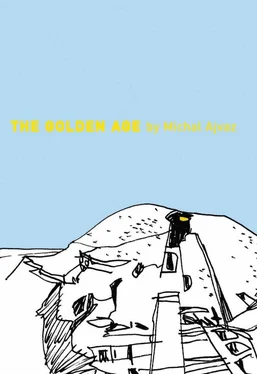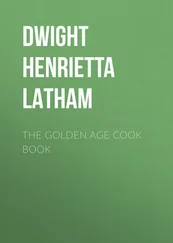Michal Ajvaz - The Golden Age
Здесь есть возможность читать онлайн «Michal Ajvaz - The Golden Age» весь текст электронной книги совершенно бесплатно (целиком полную версию без сокращений). В некоторых случаях можно слушать аудио, скачать через торрент в формате fb2 и присутствует краткое содержание. Год выпуска: 2010, Издательство: Dalkey Archive Press, Жанр: Современная проза, на английском языке. Описание произведения, (предисловие) а так же отзывы посетителей доступны на портале библиотеки ЛибКат.
- Название:The Golden Age
- Автор:
- Издательство:Dalkey Archive Press
- Жанр:
- Год:2010
- ISBN:нет данных
- Рейтинг книги:4 / 5. Голосов: 1
-
Избранное:Добавить в избранное
- Отзывы:
-
Ваша оценка:
- 80
- 1
- 2
- 3
- 4
- 5
The Golden Age: краткое содержание, описание и аннотация
Предлагаем к чтению аннотацию, описание, краткое содержание или предисловие (зависит от того, что написал сам автор книги «The Golden Age»). Если вы не нашли необходимую информацию о книге — напишите в комментариях, мы постараемся отыскать её.
is Michal Ajvaz’s greatest and most ambitious work.
The Golden Age
The Golden Age — читать онлайн бесплатно полную книгу (весь текст) целиком
Ниже представлен текст книги, разбитый по страницам. Система сохранения места последней прочитанной страницы, позволяет с удобством читать онлайн бесплатно книгу «The Golden Age», без необходимости каждый раз заново искать на чём Вы остановились. Поставьте закладку, и сможете в любой момент перейти на страницу, на которой закончили чтение.
Интервал:
Закладка:
And it is impossible to stop this great birth of people, objects and landscapes; all Fo can do is look on in astonishment. The thought flashes into his mind that once he knew someone who told him of the genesis of a world like this, that then he barely understood a word of what the other was talking about. But now there is no room in his mind for reminiscences: it is fully engaged with this great birth, which is now painful and blundering, now easy and smooth. Throughout it beats out its shape with incredible power, a power impossible to resist and which sweeps all other thoughts and memories aside.
Even the thought that this new world has no meaning, purpose or idea, that it has no knowledge to convey and is entirely unnecessary, cannot hinder its rampant growth. It is neither a symbol nor an archetype, neither more interesting nor more boring than other worlds. To Fo its very senselessness is a source of delight the like of which he has never known before. All night long he lies on the palliasse and follows the genesis of this world. There are times when he must prepare the way for the images it brings, others when all he needs to do is watch them arrive without his assistance. As day begins to break, he takes one of the sheets from the pile of paper, and on its blank side he begins to write his dispatch from this new world.
Conspirators on Vauz
The Book made no mention of whether Fo has a pencil with him or whether he finds this, too, in the cabin. But there is plenty of paper in the cabin on which Fo can write everything down in careful detail. And I have no doubt that this is indeed what he does, with a pedantry common to all the imaginary authors who tell their stories and stories within stories on all levels of the Book , with their endless descriptions of the patterns on the dresses of princesses and the ornamentation of the walls of palaces. At this point in the text there was a pocket that contained Fo’s writings from the cabin; this pocket was so full that when I unstuck it, it burst open like an over-ripe pod and the paper folded within it tumbled out, compressed concertinas falling to the ground, there continuing to unfurl. I was reminded of the festoons of a fancy-dress ball.
I could pick out individual words written on all this paper — words telling of monsters of the deep and of palaces on planets in distant galaxies, words that tempted me to delve into this insertion. But I decided not to let myself be detained by a never-ending novel about a radish; I would not let the wily Book draw me into the wretched labyrinth of insertions. I would read the insertion that told of the origins of the statue in jelly, I told myself, and then I would make an orderly return to the story of Gato, Hios and poor, hard Nau: I wished to find out at last whether Gato succeeds in getting the gemstone out of the statue and whether his mother is restored to health. So I proceeded to stuff the fallen paper back into its pocket. But when its billowing end was about to reach the table-top, I realized my resolve was no match for my curiosity; the accursed radish had befuddled me, just as it does Fo.
I was worried that after my return from the island the radish would appear to me on wakeful nights, and when at last I fell asleep it would turn itself into a monster and pursue me around a never-ending labyrinth. I would forever be in its power just because I had failed to read about what happened between it and the king. To return to the island in an attempt to make this good would be to no avail — in the ever-changing Book , the story of the radish and the king would be long gone. With a heavy sigh I pulled the long strip of paper back out of the insertion and set to reading Fo’s work. I shall do what I can to rebuild my memories of what I read in it; I would ask for your forbearance, dear reader, as I embark on this journey into the bowels of the Book .
Consider yourself the experienced leader of a speleological expedition. I am well aware of the great demands that this descent to the lower levels of the text places on you (I wouldn’t wish to worry you, but I suppose you know that this will be followed by an ascent less pleasant still). I appreciate the need to make this as easy as I can for you; perhaps each level of the Book could be printed in a different colour to make orientation simpler. But then again, this might be too expensive. Better still (and even less realizable) would be to distinguish the different levels by the same method the islanders use to tell time: the text could be printed on paper saturated with a different scent at each level. (A difficult task for printing the work, but it need not be difficult for you; those readers made dizzy by the use of different colours for different levels may find it relatively simple to produce a scented book.)
On the very edge of the archipelago on the island of Vauz, there lives a king called Dru. Dru is a celebrated patron of the arts and sciences, and in his youth he, too, was a scientist — he is the author of a number of books on mathematics and astronomy. These are the first sentences Fo writes in the cabin. Festering wounds left by real and imagined slights overlaid with etiquette, age-old feuds between families that are incurable because their roots are long forgotten, the tangles of minor grudges and the bitterness that is always abroad in the fine dust of the atmosphere of a hierarchical society — when all these things ripen into treason, a conspiracy against the king is conceived in the royal court. The conspirators desire the king’s death, but to kill the king is no simple matter for he is attended at all times by a well-armed, dependable entourage; nor is it possible to use poison against him, as one of his retainers always tastes his meals before him. Only certain members of the military command are involved in the plot, and the conspirators know that it is possible to move against those divisions loyal to the king only in the confusion that would follow the king’s death. The admiral of the royal fleet devises a plan that the other plotters at first consider eccentric and fantastical, but in the end they are forced to admit that it is probably the only way in which they can kill the king. The plan is founded on the knowledge that the king has a weak heart. His physicians have warned him that a great shock of any kind could bring about his immediate death. The admiral has spent his life sailing the seas, and he knows where to find a deep underwater valley that is the resting place of giant squids; he knows that the scent of a certain plant will draw this animal out of its lair and can be used to make it follow a ship; he knows, too, that the squid springs up out of the water when it hears a certain sound.
With his young fiancée Isili, his friends, members of his household and a group of musicians, King Dru likes to dine on a little platform carved into the face of the sheer, smooth rock at whose top stands the royal palace. The platform is only half a meter above the sea, and it is reached from the palace by a zig-zagging flight of steps that is also carved into the rock. The sheer wall of rock continues beneath the surface; the water here is so deep that no diver has ever succeeded in reaching the seabed. It is to the deep waters near the little platform that the admiral wishes to lure one of the squids. While the king is sitting at dinner, one of the musicians will sound a horn with a peculiarly deep tone; as soon as the squid hears this, nothing will be able to stop it from plunging itself above the surface. The admiral and his fellow conspirators are hoping that the sudden appearance of the giant, monstrous head with its mad eyes, will be enough to give the king a heart attack and to bring about his death. Another advantage of this plan is the unlikelihood that anyone will make the connection between the sounding of the horn and appearance of the squid, meaning that the conspirators will not come under suspicion should the plan fail and the king remain alive.
Читать дальшеИнтервал:
Закладка:
Похожие книги на «The Golden Age»
Представляем Вашему вниманию похожие книги на «The Golden Age» списком для выбора. Мы отобрали схожую по названию и смыслу литературу в надежде предоставить читателям больше вариантов отыскать новые, интересные, ещё непрочитанные произведения.
Обсуждение, отзывы о книге «The Golden Age» и просто собственные мнения читателей. Оставьте ваши комментарии, напишите, что Вы думаете о произведении, его смысле или главных героях. Укажите что конкретно понравилось, а что нет, и почему Вы так считаете.












